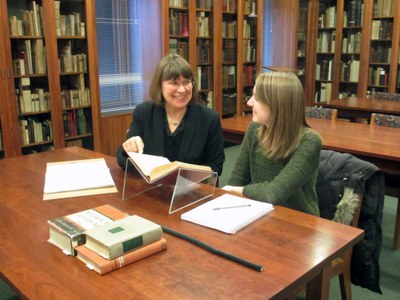The Benefits of Being CURIAS

Over winter break, Schreyer Honors College senior Julianne McCobin found herself in the Mortimer Rare Book Room at Smith College flipping through a copy of Ulysses. But not just any copy of James Joyce’s massive tome—one with Sylvia Plath’s notes handwritten in the margins. As she examined Plath’s marginalia more closely, McCobin noticed that the notes were written in different colored ink, and that the different colors seemed to reflect changes in Plath’s thought processes. Later, after she returned to State College, she began the task of incorporating her findings into her English honors thesis, a yearlong endeavor that requires both extensive research and advanced rhetorical and analytical skills.
While archival material often enhances a senior thesis, many undergraduate students lack familiarity with the required research methodologies. In response, CALS director Sean Goudie proposed a three-stage grant program for English majors, the CALS Undergraduate Research in the Archives Scholars (CURIAS). CURIAS scholars undergo two training sessions, one in Penn State’s Special Collections and one in various Philadelphia archives, before they independently select and visit archives relating to their theses. English graduate student Sarah Salter mentored the inaugural class of CURIAS scholars, helping the students navigate Penn State’s Special Collections. For Salter, the opportunity to foster undergraduate research was deeply rewarding. “It was wonderful,” she said, “to see the participants go from feeling a bit overwhelmed at the start of the day to being comfortable, confident, and very intelligent archival researchers in the space of one day's activities.”
At Smith, McCobin was able to sharpen her thesis with the help of Karen Kukil, the librarian who not only oversees the Plath collection but is also the editor of Plath’s journals. Working closely with Kukil provided McCobin invaluable insight that few other undergraduates studying Plath will be afforded. Thanks to her time in the archives, McCobin’s project now examines Plath’s journaling as a material process, rather than merely a product. “The chance to do archival research as an undergrad is really unique,” reflects McCobin, “and this opportunity allowed me to deepen my knowledge of the topic. I really couldn’t have researched my topic thoroughly without this grant.”
CALS looks forward to replicating McCobin’s success with future cohorts of CURIAS scholars. Made possible by generous support from the Paterno Family and the College of the Liberal Arts, the program showcases the Penn State English major as an undergraduate program committed to scholarly excellence. But just as importantly, the CURIAS program is an exciting reminder of what makes studying literature so rewarding—as McCobin exclaimed, “It’s so amazing to finally see and hold what you’ve been studying for so long!” Igniting and fostering enthusiasm like McCobin’s in Penn State undergraduates is a primary mission of CURIAS, and CALS continues to look for new ways to channel this excitement into rewarding experiences for the Penn State students it serves.
The author of this article, Hannah Burks, is the 2013-2014 CALS undergraduate intern.

McCobin and Karen Kukil examine Plath's annotations together.

Over winter break, Schreyer Honors College senior Julianne McCobin found herself in the Mortimer Rare Book Room at Smith College flipping through a copy of Ulysses. But not just any copy of James Joyce’s massive tome—one with Sylvia Plath’s notes handwritten in the margins. As she examined Plath’s marginalia more closely, McCobin noticed that the notes were written in different colored ink, and that the different colors seemed to reflect changes in Plath’s thought processes. Later, after she returned to State College, she began the task of incorporating her findings into her English honors thesis, a yearlong endeavor that requires both extensive research and advanced rhetorical and analytical skills.
While archival material often enhances a senior thesis, many undergraduate students lack familiarity with the required research methodologies. In response, CALS director Sean Goudie proposed a three-stage grant program for English majors, the CALS Undergraduate Research in the Archives Scholars (CURIAS). CURIAS scholars undergo two training sessions, one in Penn State’s Special Collections and one in various Philadelphia archives, before they independently select and visit archives relating to their theses. English graduate student Sarah Salter mentored the inaugural class of CURIAS scholars, helping the students navigate Penn State’s Special Collections. For Salter, the opportunity to foster undergraduate research was deeply rewarding. “It was wonderful,” she said, “to see the participants go from feeling a bit overwhelmed at the start of the day to being comfortable, confident, and very intelligent archival researchers in the space of one day's activities.”
At Smith, McCobin was able to sharpen her thesis with the help of Karen Kukil, the librarian who not only oversees the Plath collection but is also the editor of Plath’s journals. Working closely with Kukil provided McCobin invaluable insight that few other undergraduates studying Plath will be afforded. Thanks to her time in the archives, McCobin’s project now examines Plath’s journaling as a material process, rather than merely a product. “The chance to do archival research as an undergrad is really unique,” reflects McCobin, “and this opportunity allowed me to deepen my knowledge of the topic. I really couldn’t have researched my topic thoroughly without this grant.”
CALS looks forward to replicating McCobin’s success with future cohorts of CURIAS scholars. Made possible by generous support from the Paterno Family and the College of the Liberal Arts, the program showcases the Penn State English major as an undergraduate program committed to scholarly excellence. But just as importantly, the CURIAS program is an exciting reminder of what makes studying literature so rewarding—as McCobin exclaimed, “It’s so amazing to finally see and hold what you’ve been studying for so long!” Igniting and fostering enthusiasm like McCobin’s in Penn State undergraduates is a primary mission of CURIAS, and CALS continues to look for new ways to channel this excitement into rewarding experiences for the Penn State students it serves.
The author of this article, Hannah Burks, is the 2013-2014 CALS undergraduate intern.

McCobin and Karen Kukil examine Plath's annotations together.